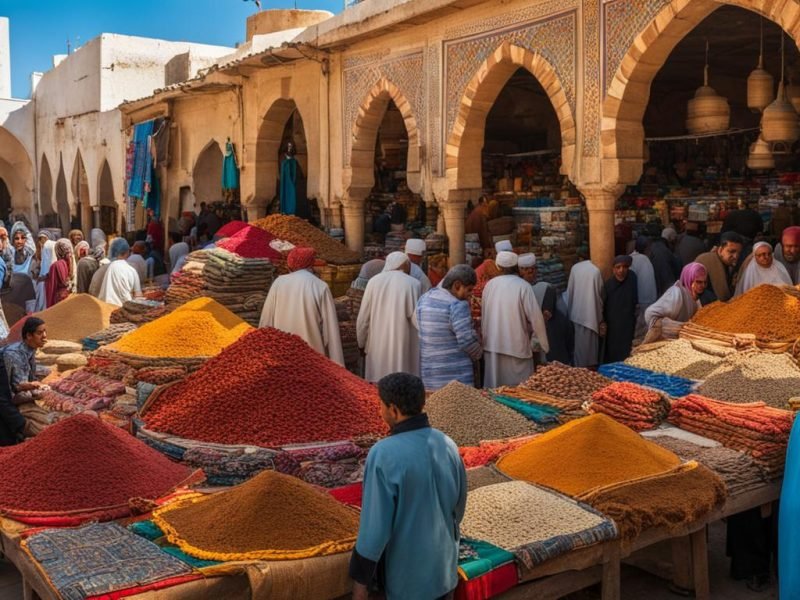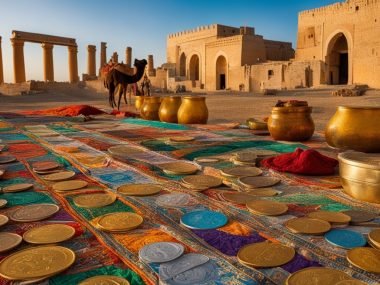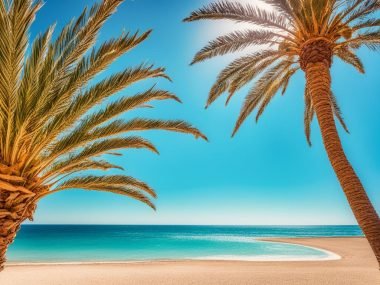As an avid traveler from the United States with a curiosity for exploring diverse cultures and landscapes, I often find myself asking, “Can I Travel To Tunisia Without Visa?” Understanding Tunisia’s visa policy is crucial to planning my ventures. With the Tunisia visa waiver in place, I can visit this North African jewel visa-free for a set period. This makes it much simpler to experience Tunisia’s rich history, cuisine, and Mediterranean beaches without the hassle of obtaining a visa beforehand.
Tunisia has opened its doors to many tourists like me by allowing visa-free entry or visa on arrival under specific conditions. Its inviting Tunisia visa policy is particularly favorable to U.S. citizens, among others, permitting up to 90 days of exploring its enchanting cities and scenic countryside. A check on the latest Tunisia entry requirements, however, remains a crucial step before booking any flights, especially with the still-present waves of the COVID-19 pandemic affecting travel norms globally.
Key Takeaways
- Tunisia offers a visa waiver for U.S. citizens, allowing 90 days of visa-free travel.
- Staying updated on Tunisia visa policy is important, as it is subject to change.
- Before traveling, verify if Tunisia has any ongoing entry requirements such as COVID-19 testing or quarantine protocols.
- Even with visa-free status, adhering to Tunisia’s entry requirements ensures seamless travel.
- Travelers from the U.S. can enjoy Tunisia visa on arrival, adding convenience to spur-of-the-moment trips.
Understanding Tunisia’s Visa Policy
My journey as a globetrotter often takes me to destinations with complex visa regulations, but Tunisia’s approach to tourism is refreshingly straightforward. Delving into the visa requirements for Tunisia, I discover that Tunisia offers the liberating option of visa-free travel to certain passport holders, including those from the United States. This visa exemption is not only a gateway to the country’s cultural expanse and sun-drenched Mediterranean coasts but also a testament to its welcoming attitude towards tourists and travelers.
Visa Exemptions for Various Countries
One significant aspect of Tunisia’s visa policy is its list of Tunisia’s visa exemption countries, which makes the nation accessible to a diverse group of travelers. I take a closer look, and it’s pleasing to note that countries such as Canada, where residents can enjoy up to four months of Tunisian dreams without a visa, and European Union member states, barring Cyprus, can immerse in up to 90 days of North African adventure. Tunisian warmth extends to far-reaching lands, allowing citizens from regions as vast as North America, certain parts of Asia, and notable chunks of Europe to bask in its historical and modern marvels sans visa.
A further glance through the policy reveals that nationals from Bulgaria can soak in the Tunisian essence for two months, which shows the nuanced approach Tunisia takes, tailoring visitor stays to foster international relations and tourism growth. It’s a policy that has not only piqued my interest but continues to encourage wanderlust-driven individuals to chart Tunisia on their travel maps.
Categories of Permissible Entry Without a Visa
To my delight, I find that tourists wanting to experience Tunisia’s rich history and bustling market life can often do so without the prerequisite of a visa. This ease of entry under the Tunisia’s tourist visa exemption is a significant pull factor for many looking to explore this vibrant country. The categories are clear-cut, offering a hassle-free itinerary to those qualifying for visa-free access. This accessibility aligns perfectly with my travel philosophy – the fewer the barriers, the deeper the exploration.
Recent Changes in Tunisia’s Entry Requirements Due to COVID-19
The winds of change brought by COVID-19 have not left Tunisia’s shores untouched. In adapting to the unpredictable tides of the pandemic, Tunisia introduced a color-coded system, categorizing countries into red, orange, and green zones. Each comes with its own set of entry requirements, influenced by the COVID-19 case tallies and trends. The ever-fluid landscape of travel norms necessitates that I, like all travelers, keep abreast of Tunisia’s COVID-19 entry policy, ensuring voyages remain both safe and exhilarating.
As I ready myself for what could be an epic Tunisian tale, I stay vigilant on updates, knowing that changes can occur weekly. These entry policies are pivotal, deciding factors in actualizing my travel plans and those of fellow travelers eager to set foot in Tunisia’s storied lands.
Eligibility Criteria for Visa-Free Travel to Tunisia
As I explore the intricacies of the Tunisia visa policy, it becomes clear that my eligibility for visa-free entry to Tunisia hinges on the specifics of my citizenship. Countries under Tunisia’s visa exemption umbrella grant me, as a U.S. citizen, and others from select nations, the opportunity to enjoy the Tunisian landscapes without the formality of a visa.
- For a stay reflective of the warm Tunisian hospitality, I consider my duration of permitted stay based on my nationality – from the liberal 90 days rewarded to U.S. citizens to the extended four months granted to my Canadian friends.
- The beckoning of the ancient medinas and sprawling beachfronts is louder for those from ‘green’ countries, who can wade into Tunisia’s richness without barriers.
- Conversely, adjusted precautions denote that visitors from ‘orange’ or ‘red’ countries like myself must navigate additional Tunisia entry requirements, including the possible need for testing and quarantine measures.
To provide a clear picture of this eligibility mosaic, I present a table of nations benefiting from Tunisia’s visa exemption:
| Country | Visa Exemption Duration | COVID-19 Category |
|---|---|---|
| United States | Up to 90 days | Green |
| Canada | Up to 4 months | Green |
| Germany | Up to 4 months | Orange |
| Italy | Up to 90 days | Orange |
| France | Up to 90 days | Red |
Properly armed with knowledge of the reciprocity of travel agreements and current health advisories, I navigate my path to Tunisia with confidence, ensuring my trip aligns with both my wanderlust and the entry protocols of this historic nation.
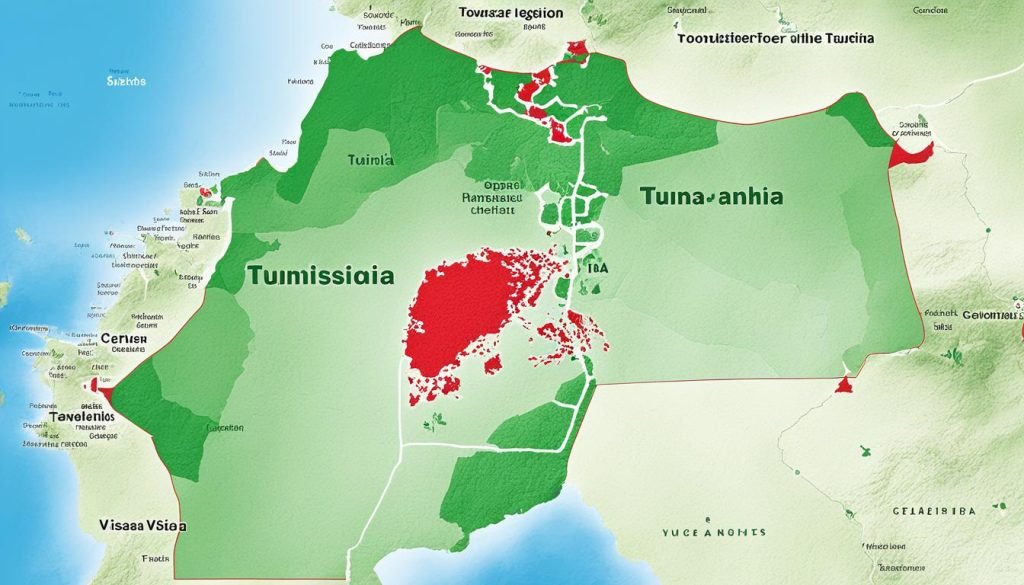
The shifting sands of pandemic classifications call for constant vigilance and adaptation. But even amidst these global ripples, Tunisia’s embrace remains open to travelers – as long as we heed the necessary procedures and respect the land and its people.
Preparing for Your Tunisian Visit: Essential Entry Information
With Tunisia’s enthralling landscapes just a flight away, it’s vital to wrap my head around the nuances of Tunisia’s entry requirements. Proper travel documentation is the key to a hassle-free arrival, ensuring that cultural exploration is the focus of my journey, not border formalities. Let’s walk through the must-haves and must-dos to set foot on Tunisian soil.
Travel Documentation and Identification
To enter Tunisia, I’m aware that a valid passport is non-negotiable. For my European friends, except Cypriots, a national ID card could suffice when traveling as part of an organized tour with a hotel voucher. It’s a relief to know my travel documentation for Tunisia doesn’t involve complex visa processes, liberating me to focus on the thrilling aspects of travel.
Health and Safety Protocols for Travelers
Amidst the rolling sands and timeless streets, health remains a priority. I acknowledge the importance of staying informed on the health and safety protocols Tunisia has put in place for travelers. These measures are shaped by the world’s evolving health landscape, requiring me to stay updated with the latest Tunisia travel advisory. Confirming the color-coded categorization of countries before departure helps me prepare for any required tests or quarantine procedures.
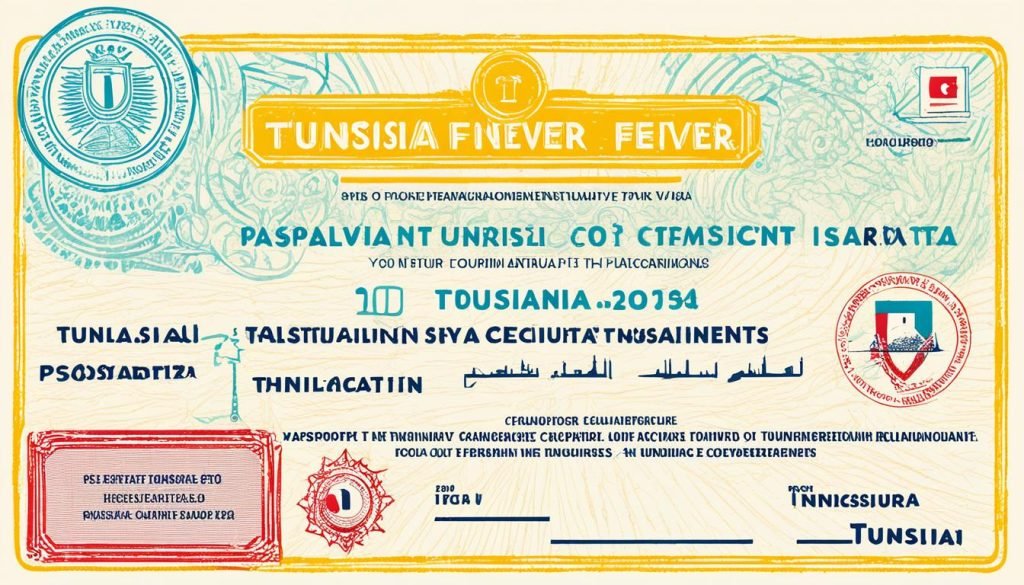
Registration Requirements for Desert Travels
The allure of Tunisia’s deserts calls for a special kind of adventure, one that comes with additional preparations. Plotting a course through these vast expanses necessitates registering my travel plans ahead of time. If my compass points me towards areas designated as military zones, then acquiring special authorization is a must. Of course, I’m reminded to secure medical evacuation insurance; outside of Tunisia’s urban heartbeat, timeliness of medical aid is less certain.
Security Considerations and Advisory for U.S. Travelers
As a U.S. citizen planning my travels to Tunisia, I’m cognizant of the Tunisia travel advisory and the importance of adhering to security considerations in Tunisia to ensure my safety. Terrorism remains a significant threat, with terrorists often targeting public spaces favored by Westerners, including cafes and shopping malls. I take note that I should maintain vigilance in public areas and transportation hubs, being mindful of the ongoing risk of attacks using simple methods such as knives and vehicles.
The possibilities of theft and scams are concerns I’m aware of when visiting Tunisia. I gather that visitors to the country, myself included, should be particularly cautious with their belongings in tourist hotspots and upscale neighborhoods. I make a mental note to keep my valuables secure and to be wary of pickpocketing attempts or scams targeting foreign visitors.
During my stay, I understand that demonstrations can unexpectedly take place and present potential risks. Bearing in mind the advice from the U.S. Department of State, I’m prepared to stay informed through local media and to avoid areas where large gatherings or protests are occurring.
| Risk | Examples | Precautionary Measures |
|---|---|---|
| Terrorism | Attacks on public venues, kidnappings, etc. | Exercise vigilance, avoid crowded areas, stay updated via media |
| Theft and Scams | Pickpocketing, fraudulent schemes targeting tourists | Guard personal belongings, be skeptical of suspicious offers |
| Demonstrations | Political rallies, economic protests | Monitor local news, steer clear of protest sites |
If I encounter an emergency or fall victim to a crime, I’m aware that I should contact the local police, and I can also reach out to the U.S. Embassy for assistance. The realization that I’m responsible for my well-being, coupled with the support system in place from local and U.S. entities, gives me some comfort as I prepare for my Tunisian adventure.
In my quest for cultural immersion and discovery, I remind myself that the foundational brick to a memorable journey is ensuring my own safety by respecting and following the security considerations in Tunisia. With a proactive mindset and up-to-date information, I aim to navigate Tunisia’s vibrant landscape securely and respectfully.
Conclusion
In wrapping up my exploration of the visa policies and travel considerations for Tunisia, I recognize the ease with which certain passport holders can embark on their Tunisian adventure thanks to the Tunisia visa waiver. Specifically, as a U.S. citizen, I can appreciate the opportunity to travel to Tunisia visa-free, enabling me to indulge in the country’s rich history and natural beauty without the extra step of visa procurement.
However, I’m also aware that a successful trip hinges on adhering to Tunisia’s entry requirements, including staying up-to-date with the most recent travel advisories. Given the global situation with COVID-19, the importance of understanding Tunisia’s travel restrictions cannot be overstated. Whether it’s the simplicity of visa-free entry for ‘green’ countries, the pre-travel requirements for ‘orange’ zones, or the stringent protocols associated with ‘red’ zones, my readiness to comply plays a pivotal role in ensuring a smooth and secure experience.
Security considerations also weigh on my mind. From potential terrorist threats in public spaces to keeping an eye out for demonstrations or scams, preparedness is key. I’m particularly reminded of the need to remain vigilant in places of mass gatherings and whilst using public transportation systems. By aligning my travel plans with the comprehensive guidance provided by Tunisia’s visa policy and the U.S. Department of State’s recommendations, I’m setting the stage for a journey that is not only enriching but also mindful of my well-being and respectful of the local customs and regulations in Tunisia.

